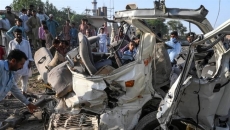Facing public skepticism about rushed COVID-19 vaccines, U.S. health officials are planning extra scrutiny of the first people vaccinated when shots become available — an added safety layer experts call vital.
A new poll suggests those vaccine fears are growing. With this week's pause of a second major vaccine study because of an unexplained illness — and repeated tweets from President Donald Trump that raise the spectre of politics overriding science — a quarter of Americans say they won't get vaccinated. That's a slight increase from 1 in 5 in May.
The poll from The Associated Press-NORC Center for Public Affairs Research found only 46% of Americans want a COVID-19 vaccine and another 29% are unsure.
More striking, while Black Americans have been especially hard-hit by COVID-19, just 22% say they plan to get vaccinated compared with 48% of white Americans, the AP-NORC poll found.
“I am very concerned about hesitancy regarding COVID vaccine,” said Dr. William Schaffner, a vaccine specialist at Vanderbilt University who says even the primary care doctors who'll need to recommend vaccinations have questions.
“If the politicians would stand back and let the scientific process work, I think we’d all be better off,” he added.
The stakes are high: Shunning a COVID-19 shot could derail efforts to end the pandemic — while any surprise safety problems after one hits the market could reverberate into distrust of other routine vaccines.
On top of rigorous final testing in tens of thousands of people, any COVID-19 vaccines cleared for widespread use will get additional safety evaluation as they're rolled out. Among plans from the Centers for Disease Control and Prevention: Texting early vaccine recipients to check how they're feeling, daily for the first week and then weekly out to six weeks.
Any vaccine before Election Day is extremely unlikely. Over Trump’s objections, the Food and Drug Administration issued clear safety and effectiveness standards that shots must meet -- and Commissioner Stephen Hahn insists career scientists, not politicians, will decide each possible vaccine's fate only after all the evidence is debated at a public meeting.
Dr. Anthony Fauci, the top U.S. infectious diseases expert, says that should be reassuring because it means scientists like himself will see all the evidence.
“So the chances of there being secret hanky-panky are almost zero, because everything is going to be transparent,” he told The AP.
Here are some things to watch as vaccines get closer to the finish line.
THERE’S STILL NO GUARANTEE
Furthest along in final-stage testing in the U.S. are a vaccine candidate made by Pfizer Inc. and Germany’s BioNTech, and another developed by Moderna Inc. and the National Institutes of Health.
Fauci says “the best bet” is that data about whether one or both work will emerge sometime in November or December.
How soon depends on an independent Data Safety and Monitoring Board -- the only group that can peek at the data before the study’s finished. At pre-set time points, the board can analyze the number of infections occurring so far among participants and decide if the study should be stopped early because of strong evidence the vaccine works, or if it’s failing, or that it’s too soon to know.
EFFECTIVENESS IS ONLY HALF THE STORY
The DSMB also watches for side effects. Many vaccines cause temporary side effects like fever, chills and other flu-like symptoms.
Two other vaccine candidates in final-stage testing in the U.S. have been temporarily halted to investigate additional safety questions. Johnson & Johnson paused its study this week after learning of “an unexplained illness” in one participant, and the company expects it will take a few days to learn if the problem is a side effect or a coincidence.
But testing of AstraZeneca's vaccine has been on hold in the U.S. for over a month after news emerged of neurological illnesses in two British participants. Regulators let AstraZeneca's study resume in Britain and several other countries, but FDA still is deciding.
Stopping those studies “shows you that the system that we have in place to monitor the safety of the vaccines and the rigorous conduct of the trial is in place and it's working,” Schaffner said.
Looking back at vaccines for other diseases, side effects show up within two to three months, said FDA vaccine chief Dr. Peter Marks.
So FDA told COVID-19 vaccine makers: If they seek “emergency use authorization” to get their shot to market faster than normal, they still would have to track half the participants for two months after the last dose.
Then it would take FDA several weeks of breakneck work to decide if a COVID-19 vaccine really was suitable for emergency use, Marks said. In contrast, evaluating an application for full approval could take months, as FDA officials comb through fuller records of how participants fared.
EXTRA SAFETY STEPS
Even large final tests won't catch a side effect that happens in, say, 1 in 100,000 people. So there's an early warning system that monitors every vaccine sold in the U.S. to spot unsuspected side effects.
“It’s a system that has served us very well,” said Dr. Bruce Gellin of the Sabin Vaccine Institute, who once directed the government’s National Vaccine Program Office. “But for this unprecedented vaccination campaign, we need to expand” that monitoring.
Once the FDA clears a vaccine, health workers and other essential workers are expected to get the first doses — and they'll have to sign an agreement to do so that includes their cell number and email. The CDC will use those registrations to check how the vaccinated are feeling.
Any health complaint bad enough that they missed work, couldn’t do a normal activity or had to seek medical care gets a follow-up probe, said CDC’s Dr. Tom Shimabukuro.
Separately, the FDA will be checking giant databases of insurance claims and electronic medical records, to see if people who received vaccine also have an uptick in health care.
And states including New York, Rhode Island and Virginia are forming advisory committees to review the safety of any COVID-19 vaccines that pass FDA.






